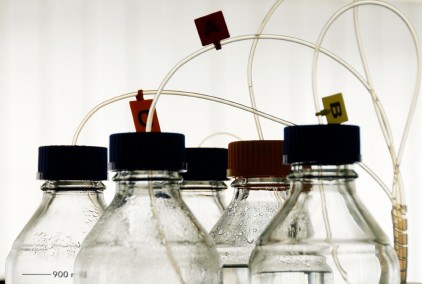MTS Helpdesk
Question:
What is the typical (the industrial ‘norm’) for the expiration date of mobile phases for HPLC, i.e. with buffer and without buffer. Also, what should you do (e.g., measure the pH or run and verify the retention time) if you need to extend the expiration date in extenuating circumstance e.g. shortage of acetonitrile or delay of the orders from the vendor, etc.?
Answer:
There is no industrial ‘norm’ for the expiration date assigned to HPLC mobile phase because the composition of mobile phase varies so greatly. In general, preparing fresh mobile phase is best and if possible, it is a good idea to prepare as much as you are likely to need for a particular chromatographic run. Since it is wasteful (in terms of both cost and environment) to dispose of solvents when it is not really necessary, I would make the following recommendations.
Buffers are most likely to cause problems on storage due to bacterial and fungal growth but all buffers do not behave in the same way. An example of a buffer in which growth occurs very soon after preparation is a phosphate buffer at pH 7. You should assess how long a buffer should be kept for your particular method. If the buffer (or water) is not mixed with organic solvent (for example when you use the HPLC system to mix the mobile phase for you) then it will probably not last as long. Assessing the buffer for a suitable expiry date consists of checking for visual growth (dispose of the buffer if you can see any), and checking the chromatographic performance.
The easiest way to check chromatographic performance is to use the system suitability test for the method, this includes any standard checks. If the system suitability is well designed, it should be able to confirm that a particular mobile phase is giving the expected results and is suitable for use. You may find that methods where the pH of the buffer is close the the pKa of an analyte will be more affected by smalll pH changes due to buffer degradation.
Typically, for blends of aqueous buffers or water with organic solvents, where the aqueous content is less than 20%, an expiry date of 1 month after preparation is suitable and it is possible that you could extend this to 6 months. For blends where the aqueous content is greater than 20%, assess visually and check chromatographic performance.
For mobile phases which do not contain buffers and consist of blends of organic solvents, you can easily set an expiry date of 6 months, but you may need to watch out for changes in the relative amounts of solvents due to evaporation. My personal preference is to use the HPLC system to blend solvents in this situation and thus a single solvent is in each mobile phase reservoir and changes in the composition cannot occur.
Submit a Question to the MTS Helpdesk
Do you have a question for our expert relating to the topic of analytical chemistry? Use our enquiry form to send it to us.
Related content from our Resources Library
Services related to this content that we offer
We have a number of training courses on the topic of HPLC, which includes an introductory course, and courses on HPLC method development (including a course specifically aimed at developing stability indicating methods) and HPLC troubleshooting.
Visit our courses page for a full list of available courses and the schedule of currently available course dates.
If you are looking for a book on HPLC, our ‘Introduction to HPLC for Pharmaceutical Analysis‘ by Oona McPolin, may be just what you need.

